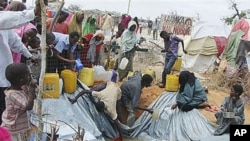The United Nations has cautioned that insecurity in Somalia continues to pose a challenge to aid workers, after a suicide bomber killed at least 72 people in the capital, Mogadishu. U.N. officials say, however, the attack has not stopped efforts to scale up assistance to those in need.
The suicide bombing in Mogadishu, which targeted a compound containing government offices, but killed mostly students, came after a period of relative calm in the Somali capital.
Government officials had said the al-Qaida-linked militant group al-Shabab had been driven out of Mogadishu, and aid agencies were taking advantage of the space to ramp up relief efforts for millions of Somalis affected by drought and famine.
But al-Shabab showed it still has a presence in the Somali capital with Tuesday's bombing, which injured well over 100 people.
Aid workers perservere
The attack may have come as a surprise, said Kiki Gbeho, the head of office for the U.N. agency coordinating relief operations in Somalia. Gbeho said aid workers, though, were soon back to business as usual.
“I was actually in Mogadishu the day of the blast, we all retreated to safe havens, we didn't move for 24 hours, but now operations are continuing as normal,” said Gbeho.
A recent report from Gbeho's office, the Office for the Coordination of Humanitarian Affairs in Somalia, noted the recent security challenges and said aid workers feel they could achieve more if the security situation would improve.
The report also says tensions have been rising between humanitarian agencies and al-Shabab officials in Somalia's Bay region, which is suffering from famine.
Increasing access
Despite al-Shabab's grip on some of the hardest-hit areas of Somalia, Gbeho said access has never been the problem.
“Contrary to what some people believe, we have always had a certain degree of access throughout south Somalia, the problem is the degree: how much you have and the scale to which you can deliver," said Gbeho. "Our challenge at the moment is that we are not able to deliver at the scale required and as fast as we should.”
The International Committee of the Red Cross in Somalia announced this week that it is scaling up relief activities in the country, despite the security concerns.
ICRC spokesman Yves Van Loo said risk has always been a part of operating in Somalia.
“We know that Somalia is still a war-affected country, so like everywhere in the world, of course we assess the security and we call to all warring parties to get a dialogue, so that's how we are performing our operations in Somalia. We explain about neutrality and independence, and we request a green light for all operations. We do not conduct any operation if the security cannot be guaranteed,” said Van Loo.
The ICRC recently announced a new effort to distribute food aid to 1.1 million people in the worst-affected areas in southern and central Somalia. The U.N. says 4 million people are affected by the food crisis in Somalia, 3 million of them in the south.




